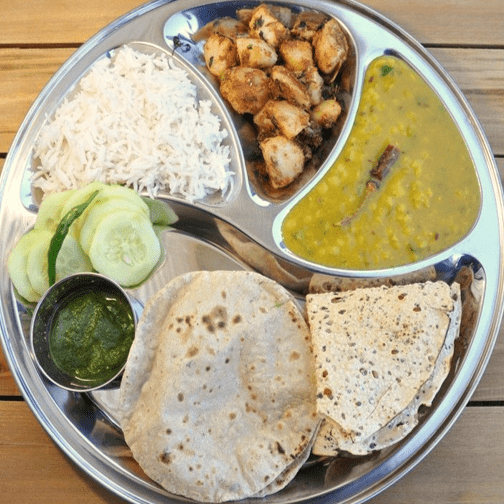
An IBS guide for an Indian diet should be tailored to the unique context of Indian foods and flavors. India is a land of diverse cultures and cuisines, but it also faces a multitude of health challenges, and Irritable Bowel Syndrome (IBS) is one that affects a significant portion of the population. This chronic digestive disorder can be particularly perplexing, but understanding its intricacies, recognizing symptoms, and implementing tailored strategies for management can greatly improve the quality of life for those affected.
Unraveling the Enigma of IBS
While the exact cause of IBS remains elusive, it is understood to be a multifaceted condition involving a combination of factors such as diet, gut sensitivity, and stress. In the Indian context, where food is not just sustenance but a cultural identity, managing IBS requires a nuanced approach that respects the rich culinary heritage while addressing the specific needs of individuals dealing with this condition.
The Spectrum of IBS Symptoms
IBS manifests itself in various ways, making it imperative for individuals to be attuned to their bodies. The spectrum of symptoms includes:
- Abdominal Pain: Recurrent or persistent pain and discomfort in the abdominal region are common indicators of IBS.
- Altered Bowel Habits: IBS can lead to diarrhea, constipation, or alternating between the two, causing irregular bowel movements.
- Bloating and Gas: Many individuals with IBS experience bloating and increased gas production, leading to discomfort and a feeling of fullness.
- Mucus in Stool: The presence of mucus in stool can be a sign of inflammation in the gastrointestinal tract.
Lifestyle Adjustments for Digestive Harmony
In the hustle and bustle of modern Indian life, making intentional lifestyle adjustments can significantly impact the management of IBS:
1. Meal Timing:
Consider the timing of your meals. In traditional Indian culture, meals are often structured around specific times of the day. Aim for regularity in your eating schedule, allowing your digestive system to establish a rhythm.
2. Food Combining:
The principles of food combining, as suggested by Ayurveda, can guide your meal choices. Avoiding incompatible food combinations, such as dairy with fruits, can help ease the digestive process.
3. Mindful Eating:
Cultivate mindfulness during meals. Take the time to savor each bite, chew your food thoroughly, and be present with the sensory experience of eating. This can enhance digestion and reduce the likelihood of triggering IBS symptoms.
4. Cooking Techniques:
Explore cooking techniques that are gentler on the digestive system. Steaming, boiling, and sautéing with minimal oil are methods that can help retain nutritional value without overloading the gut.
5. Culinary Herbs:
Integrate culinary herbs known for their digestive properties into your cooking. Herbs like mint, coriander, and ginger not only add flavor to your dishes but may also offer soothing effects on the digestive tract.
Tailoring Diet to Indian Sensibilities
Given the centrality of food in Indian culture, adjusting one’s diet is a crucial aspect of managing IBS. Here are some detailed dietary guidelines:
1. Fiber Intake:
Gradually increasing fiber intake is vital for regulating bowel movements. While fruits, vegetables, and whole grains are excellent sources of fiber, it’s essential to introduce them slowly to avoid overwhelming the digestive system.
2. Navigating Spices and Chillies:
Spices are the heart and soul of Indian cuisine, but for individuals with IBS, moderation is key. Experiment with milder alternatives such as cumin, coriander, and fennel, and observe how your body responds. Additionally, consider using asafoetida (hing), a traditional Indian spice known for its digestive properties.
3. Lactose Management:
Dairy products are prevalent in Indian dishes, but lactose intolerance can exacerbate IBS symptoms. Opt for lactose-free alternatives or experiment with traditional fermented dairy products like yogurt, which may be better tolerated.
4. Portion Control:
Paying attention to portion sizes is crucial. Indian meals are often served in generous portions, but consuming smaller, more frequent meals can ease the digestive burden.
5. Hydration Habits:
Staying adequately hydrated is essential for overall health and can aid in digestion. Traditional Indian beverages like herbal teas (such as ginger or fennel tea) and buttermilk can be hydrating and soothing for the digestive system.
IBS guide for an Indian diet should consider a complex interplay of factors affecting the gastrointestinal system, and for many following primarily an Indian diet, understanding its intricacies is crucial for effective management. It is important to consider lifestyle adjustments, alternative therapies, and practical tips tailored to the unique context of Indian foods and flavors.
The Impact of Stress on IBS
In the hustle and bustle of Indian life, stress can be a significant trigger for IBS symptoms. Incorporating stress management techniques is paramount for holistic well-being:
1. Yoga and Meditation:
Embrace the ancient wisdom of yoga and meditation. These practices not only promote relaxation but also contribute to improved gut health. Incorporating even a short daily session can make a significant difference.
2. Breathing Exercises:
Deep breathing exercises, such as pranayama, can be effective in calming the nervous system. Allocate a few minutes each day to focus on your breath, fostering a sense of tranquility.
3. Mindful Practices:
Engage in activities that bring joy and relaxation, whether it’s reading, listening to music, or spending time in nature. Cultivate mindfulness to reduce overall stress levels.
Professional Guidance and Holistic Approaches
If you suspect IBS, seeking professional medical advice is crucial. Healthcare professionals can conduct thorough assessments, ruling out other potential conditions and tailoring a management plan to your individual needs. Medications, dietary modifications, and lifestyle adjustments may be recommended based on the severity of your symptoms.
In addition to conventional medical approaches, consider incorporating holistic practices deeply rooted in Indian traditions:
1. Ayurveda:
Explore the principles of Ayurveda, India’s ancient system of medicine. Ayurveda emphasizes balance and individualized approaches to health. Consulting with an Ayurvedic practitioner can provide insights into dietary and lifestyle adjustments aligned with your unique constitution.
2. Herbal Remedies:
Traditional Indian herbs, such as triphala, licorice (mulethi), and aloe vera, are believed to have digestive benefits. However, it’s crucial to consult with an herbalist or Ayurvedic practitioner before incorporating these remedies into your routine.
Embracing a Balanced Lifestyle
In the journey of managing IBS, adopting a holistic and balanced lifestyle is paramount. Here are additional tips to enhance overall well-being:
1. Regular Exercise:
Incorporate regular physical activity into your routine. Activities like walking, jogging, or yoga can promote digestive health and alleviate stress.
2. Sleep Hygiene:
Prioritize quality sleep. Establish a consistent sleep routine and create a comfortable sleep environment to support your overall well-being.
3. Social Support:
Connect with friends, family, or support groups. Sharing your experiences and seeking support can positively impact your mental and emotional health.
Alternative Therapies and Holistic Approaches
In addition to conventional medical interventions, alternative therapies rooted in Indian traditions can be explored for their potential benefits:
1. Yoga for Digestive Health:
Specific yoga postures, such as Pawanmuktasana (Wind-Relieving Pose) and Ardha Matsyendrasana (Half Lord of the Fishes Pose), are believed to support digestive health. Consult with a certified yoga instructor to incorporate these poses safely into your routine.
2. Ayurvedic Panchakarma:
Panchakarma, a detoxification process in Ayurveda, involves therapies like Virechana (therapeutic purgation) and Basti (medicated enema). These treatments aim to balance the doshas and promote overall well-being.
3. Acupuncture and Acupressure:
Traditional Chinese medicine techniques, such as acupuncture and acupressure, have gained popularity in India. Some individuals with IBS report relief from symptoms after incorporating these therapies into their wellness regimen.
4. Probiotics and Fermented Foods:
Probiotics, often found in fermented foods like yogurt, kefir, and traditional Indian pickles, can positively influence gut health. Experiment with incorporating these probiotic-rich foods into your diet to support a healthy balance of gut bacteria.
5. Herbal Formulations:
Ayurvedic formulations, such as Hingwashtak Churna and Trikatu, are traditionally used to address digestive issues. However, it’s crucial to consult with an Ayurvedic practitioner to ensure these formulations are suitable for your specific condition.
Tailoring IBS Management to Cultural Practices
Understanding and respecting cultural practices is integral to effective IBS management in India:
1. Festival and Celebration Strategies:
Indian festivals often involve rich and indulgent foods. Plan ahead for festivals by choosing lighter options or modifying traditional recipes to suit your dietary needs. Communicate with family and friends about your dietary requirements, fostering understanding and support.
2. Travel Tips:
India’s diverse landscapes beckon exploration, but travel can pose challenges for those with IBS. Plan your travel itinerary with consideration for your digestive health. Pack snacks that align with your dietary restrictions, and research local eateries that offer suitable options.
3. Social Gatherings:
Socializing is deeply ingrained in Indian culture. Communicate openly with friends and family about your dietary needs, and consider contributing dishes to gatherings to ensure there are options that align with your digestive requirements.
4. Food Journaling:
Keep a detailed food journal to track your symptoms in relation to specific foods. This can help you identify triggers and make informed choices about what to include or avoid in your diet.
5. Community Support:
Joining online or local support groups for individuals with IBS can provide a sense of community and a platform to share experiences and tips. Connecting with others facing similar challenges can be empowering and reassuring.
The Role of Mental Health in IBS Management
The intricate connection between the mind and the gut underscores the importance of addressing mental health in IBS management:
1. Counseling and Psychotherapy:
Cognitive-behavioral therapy (CBT) has shown effectiveness in managing IBS symptoms by addressing stress and anxiety. Seeking the guidance of a mental health professional can provide valuable tools for coping with the emotional aspects of living with IBS.
2. Mind-Body Practices:
Practices such as mindfulness meditation and guided imagery can help manage stress and improve overall well-being. Integrating these practices into your daily routine may contribute to a more harmonious mind-gut connection.
You Are Not Alone
Navigating the challenges of IBS in the Indian context involves a multifaceted approach that considers dietary choices, stress management, and holistic well-being. Embrace the richness of Indian traditions, seek professional guidance, and remember that you are not alone in this journey.
By understanding your body, making informed choices, and integrating the best of both modern and traditional approaches, you can find a path towards digestive health while savoring the vibrant and diverse flavors of Indian life. Embrace the journey with resilience, and let your pursuit of well-being be a celebration of life in all its dimensions.
References:
- “Definition and Facts for Irritable Bowel Syndrome”. NIDDKD. February 23, 2015.
- Chey WD, Kurlander J, Eswaran S (March 2015). “Irritable bowel syndrome: a clinical review”. JAMA.
- Whitehead WE, Palsson O, Jones KR (April 2002). “Systematic review of the comorbidity of irritable bowel syndrome with other disorders: what are the causes and implications?”. Gastroenterology.
- Brenner DM, Moeller MJ, Chey WD, Schoenfeld PS (April 2009). “The utility of probiotics in the treatment of irritable bowel syndrome: a systematic review”. The American Journal of Gastroenterology.




























